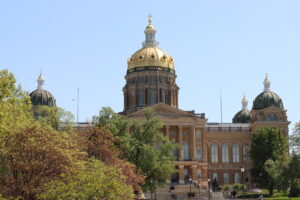Advocates seek governor’s consideration on eminent domain, PBM, 911 service boards
by Robin Opsahl, Iowa Capital Dispatch
May 29, 2025
As Gov. Kim Reynolds weighs which bills to sign into law from the 2025 legislative session, some organizations and local officials are asking the governor to reject certain measures approved by lawmakers.
The governor has until June 14 to sign into law bills passed during the 2025 session. If she does not sign or veto a measure, it is considered a “pocket veto” and is not enacted. Although there’s still a little over two weeks until the deadline, advocates are asking Reynolds to consider “pocket” or full vetos for several bills on her desk.
The highest profile bill receiving this post-session attention is House File 639, the bill relating to the use of eminent domain in carbon capture pipeline projects. Though the measure passed the Senate following a contentious debate, Reynolds has not said whether she plans to sign the bill into law. When asked about the measure on Iowa Press last week, Reynolds said her team and legal counsel are currently in the process of evaluating the bill.
She said she is hearing from people on both sides of the issue about how the legislation will impact Iowa. The bill will make multiple changes to regulations and requirements for the Iowa Utilities Commission, as well as allow more people to intervene in IUC proceedings. It also changes the definition of a “common carrier” in Iowa law and increases insurance requirements for property damage coverage and reimbursements for landowners who face higher premiums because of a pipeline on their property.
“I want to make sure that I have given individual stakeholders the opportunity to weigh in, so that I can, again, make the best-informed decision that I can, based on information I’ve heard,” Reynolds said.
While lawmakers in support of the measure and landowners who have called for more restrictions on the use of eminent domain for carbon capture pipelines — particularly related to the Summit Carbon Solutions pipeline project — opponents to the bill said the language in the bill is too broad and could create legal problems for people who have already signed easement contracts if a project like Summit cannot be completed.
This is not the only bill for which organizations are seeking further consideration:
Reimbursements for 911 services
The governor has the ability to line-item veto certain elements within budget bills — a step some public safety advocates are asking for with regard to Senate File 659, this year’s standings appropriations bill.
The legislation is largely a budget bill dealing with various state spending obligations, but it also includes several policy components that were not passed as standalone measures during the legislative session. One of the policies included in this year’s standings bill relates to costs from local 911 service boards.
The measure would allow the Iowa Department of Homeland Security and Emergency Management (HSEMD) to request reimbursement for “reasonable costs” from local 911 service boards related to the delivery of 911 call traffic to public safety answering points, or PSAPs.
Two organizations, the Iowa Association of Public-Safety Communications Officials and the state’s National Emergency Number Association, have asked for Reynolds to veto this element of the bill, arguing it could add significant costs to local first responders that would impact their ability to perform public safety duties for Iowa communities.
Chris Jasper, president of the Iowa National Emergency Number Association, said the bill’s language is “so broad” that it is difficult to tell the actual fiscal impact the measure would have on local 911 service boards. There is not a definition included in the legislation on what constitutes “reasonable costs,” and there are not specifications on dollar amounts or how often local boards can be billed by the state under the provision. Jasper said his organization has requested clarification from the state on these questions but has not received answers.
Though there are no financial estimates yet, funding coming from local first responders to the Iowa HSEMD would have to be compensated for through “cut services, potentially cut staffing, or we would have to make up for that in raising taxes,” Jasper said.
“HSEMD sends a bill for $50,000 to a county to cover their expenses, that’s $50,000 less that they have to use to purchase radio equipment for their public safety entities or to work on a project,” Jasper said. “So they would either have to scrap that project, scrap purchasing new equipment, scrap updating their equipment, or they would have to take that $50,000 and get it from a tax increase.”
Reynolds said on Iowa Press her staff is currently working on evaluating the legislation. Her office has received multiple letters and requests to veto the measure, she said, but she noted that many 911 service boards have money that is currently unspent.
“It’s a critical system,” Reynolds said. “We want to make sure that we sustain it. It’s really important to keep Iowans safe. A component of this also is that they are sitting on a $66 million surplus. So, we have to take all of that into account and make sure we understand what their concerns are, what Homeland is looking at, and find a compromise that works for everyone, but most importantly that keeps that system sustainable and make sure that we are taking into account the safety of Iowans.”
Jasper disputed Reynolds’ characterization that the money was a “surplus.” The figure of more than $60 million is divided between Iowa’s 99 counties, and many of the projects these county boards are taking on cost millions of dollars, he said, that require savings to pursue.
“When we’re talking about equipment, you know, a (computer-aided dispatch) system is a million dollars plus,” Jasper said. “We just did a radio project here in Muscatine County that was $3.9 million — I know Scott County just did one that was $8 million. And so when you think of these counties having $600,000 in the bank, they’re doing exactly what they should be doing in their planning and accounting for projects, and saving that money to cover those costs. And so it may give this perception that we’re sitting on a surplus of money, but when you break it down, we’re really not.”
Pharmacy benefit managers
Pharmacists and health care advocates have called for Reynolds to sign Senate File 383, a bill setting new regulations and requirements on pharmacy benefit managers, the entities negotiating prescription drug prices between pharmacies, drug manufacturers and insurance providers.
The legislation would make multiple changes aimed at restricting certain PBM business practices that supporters of the bill say hurt rural pharmacists, like providing financial incentives or penalties for the use of mail-order or certain pharmacies to fill prescriptions. The measure also requires PBMs reimburse prescription drug costs at the national or Iowa average acquisition cost — a higher rate than some pharmacists say they currently receive — and sets a dispensing fee of $10.68 from PBMs to pharmacists for each prescription filled at rural and small pharmacies.
In a letter to Reynolds Wednesday, a group of health care organizations and advocates including the Iowa Pharmacy Association, Iowa Association of Rural Health Clinics and Bleeding Disorders of the Heartland, urged the governor to sign the bill, saying it will help pharmacies in rural Iowa stay in business.
Kate Gainer, executive vice president and CEO of the Iowa Pharmacy Association, said in a statement the measure is needed to support Iowa health care providers across the state by addressing PBM practices “that drive up costs and limit patient choice.”
“It is this imperative that has brought many of Iowa’s top healthcare organizations and rural community advocates together to support the signing of SF 383 into law,” Gainer said in a statement. “Iowa patients can’t afford to wait any longer.”
Pharmacists and advocates in support of the bill have said PBM practices have contributed to the closure more than 200 pharmacies across Iowa, including 31 pharmacies that closed in 2024.
But some business and insurance entities have said the bill will increase health care costs for Iowans. In a statement on the bill as it went through the legislature, organizations including the Iowa Association of Business and Industry (ABI) and Iowa Business Council said the legislation would increase health care costs for both businesses and individuals. A release from ABI said the bill would add an estimated $340 million in costs to private-sector health plans statewide in addition to raising costs by roughly $169 per insured Iowan each year.
Joe Murphy, president of the Iowa Business Council, said in a statement the measure “will substantially increase costs for Iowa businesses and their employees” during a period of economic uncertainty.
“At a time when inflationary pressures from tariffs and other economic headwinds are bearing down on our state, we cannot afford to add further cost burdens through legislative action,” Murphy said. “We remain committed to a thoughtful, targeted approach to PBM reform—one that supports small, independent pharmacies serving Iowa.”
Iowa Capital Dispatch is part of States Newsroom, a nonprofit news network supported by grants and a coalition of donors as a 501c(3) public charity. Iowa Capital Dispatch maintains editorial independence. Contact Editor Kathie Obradovich for questions: info@iowacapitaldispatch.com.















